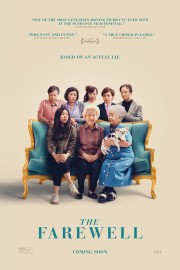The Farewell
**This was seen at the 2019 Atlanta Film Festival, and was followed by a Q&A with writer-director Lulu Wang and star Awkwafina. More will be said about that experience separately.**
(I also wrote about “The Farewell” for In Their Own League’s rundown of the 50 Best Films of the Decade. You can read that here.)
Lulu Wang’s “The Farewell” is profoundly, wonderfully universal. While no, many American audiences will not identify with this story in the sense of having done this themselves, the emotions flowing through this movie will be easily recognizable to anyone whom has had difficult decisions to make when it comes to family. I cannot wait to see it again, and to see another audience become as taken with it as I am.
The film is based on Wang’s personal experiences when her grandmother in China has been diagnosed with cancer, and that she only has a few months left to live. The catch is, the grandmother (or Nai Nai, played by the lovely and lively Shuzhen Zhou) doesn’t know, and her family- as befitting Chinese culture- has no intention of telling her, at least not until it’s closer to her time. Instead, the family has decided that her grandson, Haohao, will get married to a young woman he’s only been seeing for three months, so that the family has a happy excuse to get together, and Nai Nai will not suspect anything. Billi (Wang’s character in the film, played by Awkwafina) has been raised in America most of her life by her parents (Tzi Ma and Diana Lin), so she finds this odd, and morally objectionable. Billi is extremely close to her Nai Nai, and while her parents don’t really want her to go to China to see the family because they’re worried she will tell Nai Nai the truth. She does go, of course, and she finds her Nai Nai very welcoming, and though it’s difficult for her, Billi goes with her family’s wishes. You always wonder, however, if that shoe is going to drop.
Watching the film, I could not help but think of moments in my life when it came to people I’ve lost. I think back to my father in the year and a half from when he first went into the hospital for heart-related issues to the day he died. I think back to my grandfather Mitchell, and the 10 weeks I was with him up until he died from The Big C, especially when he got his terminal diagnosis, which I was up in Ohio with him for. I think back to how I never got to say goodbye to my other three grandparents, and how it was a relief to be at the services for them. And I think back to my aunt Nancy, and seeing her one, last time when I went up to celebrate my cousin Chad’s marriage. (No, it wasn’t planned to hide her diagnosis from her. She knew for a while how sick she was.) I think about moments where lying isn’t that bad if it’s to lessen the pain of what the truth what mean, if it means someone is happy for a bit longer before the truth hits them. I cannot necessarily imagine doing what Nai Nai’s family does here- partially because it’s illegal for health care providers to do that in the US- but I understand the reasons why they do so in “The Farewell,” and why Wang’s family did so in real-life. (There’s a coda to this film that was highly unexpected, and Wang discussing it in the Q&A was terrific.) And I also get why Billi feels so conflicted about it, and why she is asking her family or her doctor’s about the choice to not tell her- shouldn’t Nai Nai have some control over what her last days look like? It’s not an easy question, but I’m going to be honest- the answer Wang gives you will surprise you.
“The Farewell” feels like the work of a woman who found a unique way to tell a personal story that could have been a dour affair, but flips the coin towards humor and warmth that actually makes the film land stronger than if it was just a straight drama. The cast is fully capable of both, with Awkwafina doing a wonderful job of showing the complicated realm of feelings Billi is going through, as well as playing off a cast with their own unique stories to tell, as well. Wang gives us an honest, but entertaining, look at her family, but really, this could be any family, and I think she’s going to find plenty of welcoming audiences as the film makes its way to theatres. There’s plenty here to talk about the way Wang brings the film to life as a filmmaker, but as a granddaughter, a daughter, a cousin and a human being, her instincts as a storyteller go beyond making a movie. It’s about sharing a life. That’s when movies go beyond whatever technical skills brought it to life, and just bring you to a deeper appreciation of what life is capable to putting in front of us, and how we react.










